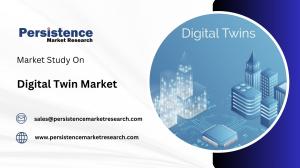Digital Twin Market Forecast to Reach USD 231.2 Billion by 2032 | Persistence Market Research Analysis
North America leads the market with a 35% share in 2025, driven by government support, advanced industries, and a mature tech ecosystem
BRENTFORD, ENGLAND, UNITED KINGDOM, September 29, 2025 /EINPresswire.com/ -- Overview of the Market
The global digital twin market is poised for unprecedented growth, with its size projected to expand from US$ 20.8 billion in 2025 to US$ 231.2 billion by 2032, registering a robust CAGR of 41.3% during the forecast period. Digital twins—virtual replicas of physical objects, processes, or systems—enable real-time monitoring, predictive analysis, and operational optimization. The surge in demand is primarily fueled by industries seeking data-driven solutions to improve efficiency, reduce operational costs, and enhance decision-making capabilities.
Industries such as manufacturing, healthcare, energy, and smart cities are adopting digital twin solutions at an accelerated pace. The manufacturing sector is leading the adoption due to its need for predictive maintenance, supply chain optimization, and simulation of complex industrial processes. Geographically, North America dominates the market, attributed to early adoption of IoT, cloud computing, and advanced AI technologies, coupled with significant investments in smart infrastructure and Industry 4.0 initiatives.
𝐆𝐞𝐭 𝐚 𝐒𝐚𝐦𝐩𝐥𝐞 𝐏𝐃𝐅 𝐁𝐫𝐨𝐜𝐡𝐮𝐫𝐞 𝐨𝐟 𝐭𝐡𝐞 𝐑𝐞𝐩𝐨𝐫𝐭: https://www.persistencemarketresearch.com/samples/35562
Key Highlights from the Report
The market is projected to reach US$ 231.2 billion by 2032 at a CAGR of 41.3%.
Manufacturing remains the leading end-user segment, driven by predictive maintenance demand.
North America dominates the market due to early technology adoption and industrial innovation.
Cloud-based digital twin solutions are witnessing higher growth due to scalability benefits.
Integration of AI and IoT enhances real-time insights and operational efficiency.
Rising investments in smart cities and infrastructure accelerate digital twin adoption globally.
Market Segmentation
The digital twin market is segmented by product type, end-user, and deployment model. In terms of product type, the market is divided into software, services, and platforms, with software solutions holding the largest share due to their extensive application in simulation, monitoring, and predictive analytics. Services such as consulting, maintenance, and implementation are witnessing increasing demand as companies require expert guidance to integrate digital twin solutions into their operations.
By end-user, the market encompasses manufacturing, healthcare, automotive, aerospace, energy, and smart cities. Manufacturing dominates due to the high demand for predictive maintenance and process optimization. The aerospace and automotive sectors are rapidly adopting digital twins to simulate vehicle performance and reduce product development cycles. Additionally, cloud-based deployment models are preferred due to scalability, cost efficiency, and seamless integration with IoT devices.
𝐃𝐨 𝐘𝐨𝐮 𝐇𝐚𝐯𝐞 𝐀𝐧𝐲 𝐐𝐮𝐞𝐫𝐲 𝐎𝐫 𝐒𝐩𝐞𝐜𝐢𝐟𝐢𝐜 𝐑𝐞𝐪𝐮𝐢𝐫𝐞𝐦𝐞𝐧𝐭? 𝐑𝐞𝐪𝐮𝐞𝐬𝐭 𝐂𝐮𝐬𝐭𝐨𝐦𝐢𝐳𝐚𝐭𝐢𝐨𝐧 𝐨𝐟 𝐑𝐞𝐩𝐨𝐫𝐭: https://www.persistencemarketresearch.com/request-customization/35562
Regional Insights
North America holds the largest market share, driven by technological advancements, the presence of leading market players, and widespread adoption of Industry 4.0 initiatives. The U.S. is at the forefront, with significant investments in smart manufacturing and AI-driven analytics.
Europe and Asia Pacific are witnessing rapid growth. Europe is focusing on sustainable industrial solutions and smart infrastructure, while Asia Pacific benefits from growing industrialization, IoT adoption, and government initiatives in smart city projects, making it a fast-emerging market for digital twin solutions.
Market Drivers, Restraints, and Opportunities
The market is primarily driven by the rising adoption of IoT, cloud computing, and AI technologies, enabling seamless integration of physical and digital systems. Companies are increasingly leveraging digital twins for predictive maintenance, cost optimization, and operational efficiency, which is driving market expansion across various industries.
However, high initial costs and technical complexity remain significant restraints, limiting adoption among small and medium-sized enterprises. Ensuring data security and integration across legacy systems also poses challenges for wider deployment.
Opportunities lie in the growing adoption of Industry 4.0 initiatives, smart cities, and connected infrastructure. Emerging technologies such as generative AI and edge computing are expected to further enhance digital twin capabilities, opening new avenues in healthcare, energy, and industrial sectors globally.
Reasons to Buy the Report
✔ Gain comprehensive insights into the market size, trends, and growth forecasts from 2025 to 2032.
✔ Understand competitive landscape and strategies of leading market players.
✔ Explore regional trends and emerging opportunities across North America, Europe, and Asia Pacific.
✔ Identify key drivers, restraints, and opportunities to make informed investment decisions.
✔ Access detailed segmentation analysis by product type, end-user, and deployment model.
Frequently Asked Questions (FAQs)
How Big is the Global Digital Twin Market?
Who are the Key Players in the Global Digital Twin Market?
What is the Projected Growth Rate of the Digital Twin Market?
What is the Market Forecast for Digital Twin Solutions in 2032?
Which Region is Estimated to Dominate the Digital Twin Industry through the Forecast Period?
𝐁𝐮𝐲 𝐍𝐨𝐰 𝐭𝐡𝐞 𝐃𝐞𝐭𝐚𝐢𝐥𝐞𝐝 𝐑𝐞𝐩𝐨𝐫𝐭: https://www.persistencemarketresearch.com/checkout/35562
Company Insights
Key players driving the digital twin market include:
Siemens AG
General Electric (GE)
IBM Corporation
Microsoft Corporation
PTC Inc.
Ansys, Inc.
Dassault Systèmes SE
SAP SE
Hitachi, Ltd.
Honeywell International Inc.
Recent Developments:
Siemens launched a new cloud-based digital twin solution to enhance real-time industrial monitoring and predictive maintenance.
GE introduced AI-driven industrial digital twins to optimize asset performance across manufacturing and energy sectors.
Related Reports:
Imaging Technology for Precision Agriculture Market: The imaging technology for precision agriculture market will grow from $1,273.5 Mn in 2025 to $2,627.4 Mn by 2032 at a 10.9% CAGR, driven by smart farming
Functional Printing Market: The global functional printing market size is projected to grow from US$34.8 Bn in 2025 to US$135.3 Bn by 2032, with a 21.4% CAGR during 2025–2032
Pooja Gawai
Persistence Market Research Pvt Ltd
+1 646-878-6329
email us here
Visit us on social media:
LinkedIn
Instagram
YouTube
Legal Disclaimer:
EIN Presswire provides this news content "as is" without warranty of any kind. We do not accept any responsibility or liability for the accuracy, content, images, videos, licenses, completeness, legality, or reliability of the information contained in this article. If you have any complaints or copyright issues related to this article, kindly contact the author above.

